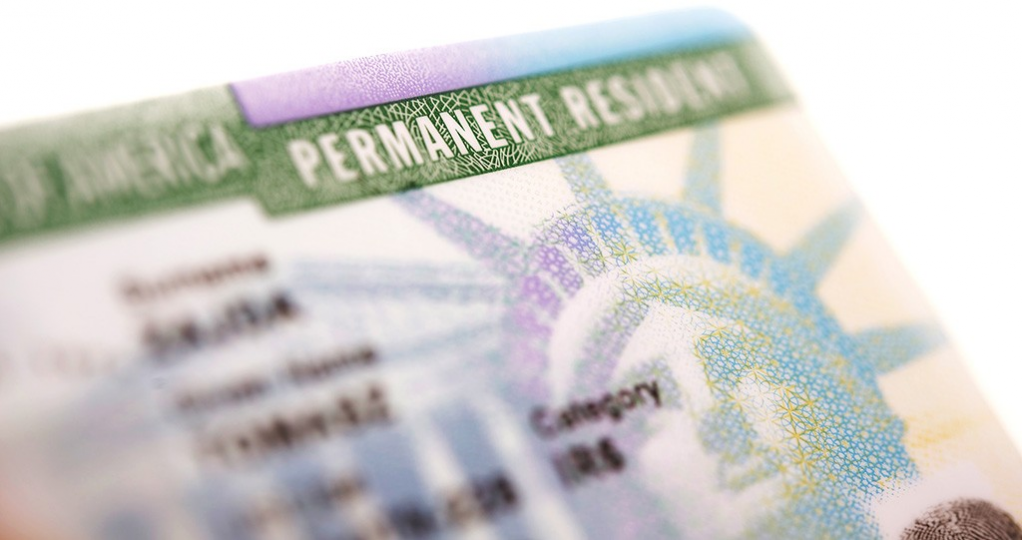Family – Based Green Cards
An adult U.S. citizen or Permanent Resident may make an I-130 application to the Immigration Service for an immigrant visa for a spouse or other close relatives such as children, mother, father, sister or brother. Once the I-130 application is approved, it does not necessarily mean that there is an immigrant visa available yet for the family member to use. The family member must wait until an immigrant visa is available for them to live permanently in the U.S. When the immigrant visa is available, your family member can file a petition with the Immigration Service to “adjust status” to alien permanent resident status (green card) inside the U.S. or make an application for Consular Processing in their home country.
The spouse of a U.S. citizen is typically entitled to an “immediately available” immigrant visa. The others are placed into preference order which determines who is given priority entry into the United States:
-
- First Preference: Unmarried, adult (21 years of age or older) sons and daughters of U.S. citizens.
- Second Preference: Spouses of lawful permanent residents and the unmarried sons and daughters of lawful permanent residents.
- Third Preference: Married sons and daughters of U.S. citizens.
- Fourth Preference: Brothers and sisters of adult U.S. citizens.
Employment- Based Green Cards
A bona fide employer in the United States may make a Green Card (permanent residence) petition for a worker coming to the U.S. to work in a particular job or profession. The employer must prove that there are no available U.S. workers to fill the offered position and that the employer will pay the prevailing wage that other U.S. workers in similarly situated jobs receive.
Categories of Employment Based Immigrant Visas:
- EB-1: Aliens with extraordinary ability are those with “extraordinary ability in the sciences, arts, education, business, or athletics which has been demonstrated by sustained national or international acclaim and whose achievements have been recognized in the field through extensive documentation.” You must be one of “that small percentage who have risen to the very top of the field of endeavor,” to be granted this classification. Also included in the EB-1 category are intra-company transferees and outstanding researchers.
- EB-2: This classification includes “members of the professions holding advanced degrees or their equivalent” and aliens “who because of their exceptional ability in the sciences, arts, or business will substantially benefit the national economy, cultural, or educational interests or welfare of the United States.”
- EB-3: Aliens with at least two years of experience as skilled workers; professionals with a baccalaureate degree; and other workers with less than two years experience, such as an unskilled worker who can perform labor for which qualified workers are not available in the United States.
- EB-4: To qualify as an EB-4 special immigrant religious worker, you must be a member of a religious denomination that has a non-profit religious organization in the United States and be registered with the same organization for at least two years before applying for admission to the United States.
Labor Certifications
Requirement for U.S. employers seeking to employ certain persons whose immigration to the United States is based on job skills or nonimmigrant temporary workers coming to perform services for which qualified authorized workers are unavailable in the United States. Labor certification is issued by the Secretary of Labor and contains attestations by U.S. employers as to the numbers of U.S. workers available to undertake the employment sought by an applicant, and the effect of the alien’s employment on the wages and working conditions of U.S. workers similarly employed. Determination of labor availability in the United States is made at the time of a visa application and at the location where the applicant wishes to work.
Asylum and Refugee Petitions
A foreign national may apply for asylum within one year of entering the U.S., whether legally or illegally, if they have a well-founded fear that they will be significantly harmed, tortured, or killed on account of their race, religion, nationality, membership in a particular social group, or political opinion in their home country. Each year, the United States resettles a limited number of refugees due to war, famine and civil unrest. A person applying for refugee status must prove that their case is of special humanitarian concern and demonstrate that they were persecuted, or have a well-founded fear of persecution on account of race, religion, nationality, political opinion, or membership in a particular social group. A refugee or asylee may apply for permanent resident status in the United States (U.S.) one year after being granted asylum or refugee status.
Green Card Through Adoption
A child who has been adopted by a U.S. Citizen parent or a Permanent Resident parent can gain immigration benefits if the child was adopted before the age of 16 and has lived with the adoptive parent(s) under their legal custody for at least two years. The I-130 Petition for Alien Relative may be filed at any time before the child reaches the age of 21, as long as the child remains unmarried. Some orphan children adopted abroad by U.S. citizen parents can gain U.S. citizenship immediately.
Religious Worker Green Cards
A bona fide nonprofit, religious organization in the United States may make a Green Card (permanent residence) petition for a religious worker coming to the U.S. to work in a particular religious vocation, job, or profession. The religious worker must have been a member of the organization’s same religious denomination for at least two years and must have completed at least two years’ work experience in the same type of religious vocation or profession they will be doing in the U.S. immediately prior to the Green Card petition process.


